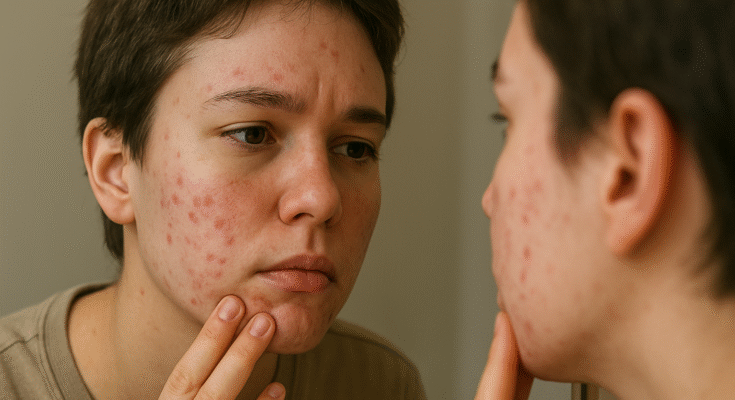Acne is often brushed off as a simple skin problem, something that happens to teenagers or people with oily skin. But the truth is far deeper. Every pimple tells a story — of stress, hormones, lifestyle, diet, and even hidden emotions. When we see acne on the skin, it is not just about surface blemishes; it is the body’s way of sending signals that something inside needs balance and care. Understanding acne in this deeper sense can change the way we approach skincare, shifting from shame and frustration to healing and empowerment.
Acne is one of the most common skin conditions in the world, yet it carries more weight than just a physical concern. For many, it impacts self-esteem, confidence, and even social interactions. The journey to clearer skin is not only about creams or medications but also about recognizing acne as a messenger of what the body and mind are going through.
At its root, acne is caused when pores become clogged with oil, dead skin cells, or bacteria. Hormonal changes, especially during adolescence or stressful times, play a major role. That’s why teenagers often experience breakouts, and adults may suddenly face acne when life becomes overwhelming. However, the surface explanation is only part of the story. Acne is a reflection of lifestyle choices — diet, sleep patterns, skincare habits, and emotional health all play interconnected roles. For example, a high-sugar diet can spike insulin, triggering inflammation and excess oil production, which feeds acne bacteria. Likewise, stress increases cortisol, a hormone that disrupts balance and often leads to breakouts along the jawline and chin.
Beyond the biological, acne deeply affects how people feel about themselves. A single breakout before a job interview, date, or social event can make someone feel insecure and anxious. Society often places a heavy emphasis on flawless skin, which adds to the pressure. Many people internalize the idea that acne equals poor hygiene or unattractiveness — both of which are false and harmful beliefs. The emotional scars of acne can sometimes last longer than the physical marks, showing how skin health and mental health are closely connected.
But here lies the empowering truth: acne is not a life sentence, and it is not a sign of weakness. It is a condition that can be understood, managed, and improved. The journey begins with awareness. Instead of attacking the skin with harsh chemicals or covering every blemish with makeup, it is more effective to listen to what the body is trying to say. A consistent skincare routine with gentle cleansing, proper hydration, and the right treatments can reduce flare-ups. Equally important are internal habits — eating more whole foods, drinking water, sleeping well, and managing stress through relaxation or mindfulness.
Acne should also remind us to be compassionate, both toward ourselves and others. Everyone experiences skin struggles at some point, even if they’re not visible. By normalizing acne and removing stigma, we create a culture of acceptance where people feel safe to seek help rather than hide in shame. Dermatologists, nutritionists, and mental health professionals can all provide valuable guidance because treating acne often requires a holistic approach — addressing the outside and the inside together.
Ultimately, acne is a reminder that our skin is alive and responsive. It reacts to our environment, our emotions, and our health. Instead of seeing it as an enemy, we can view acne as a teacher — pointing us toward better balance, self-care, and patience. Clear skin is possible, but more importantly, healthy skin and a healthy mindset are the true goals. When we shift perspective in this way, acne is no longer just about breakouts; it becomes a journey toward overall well-being.



